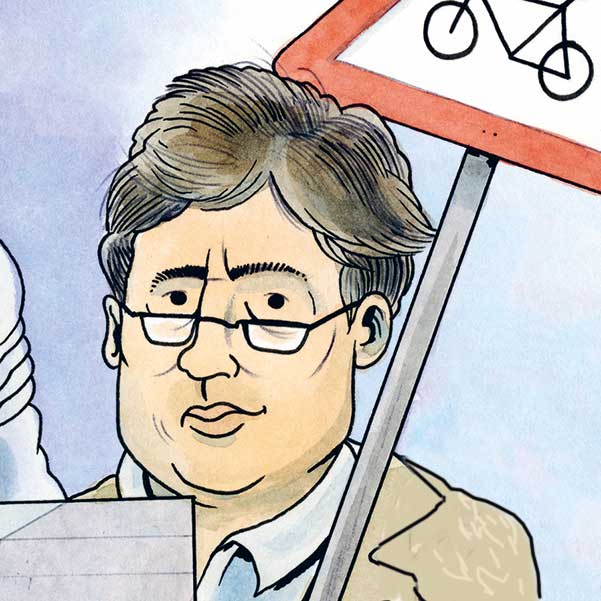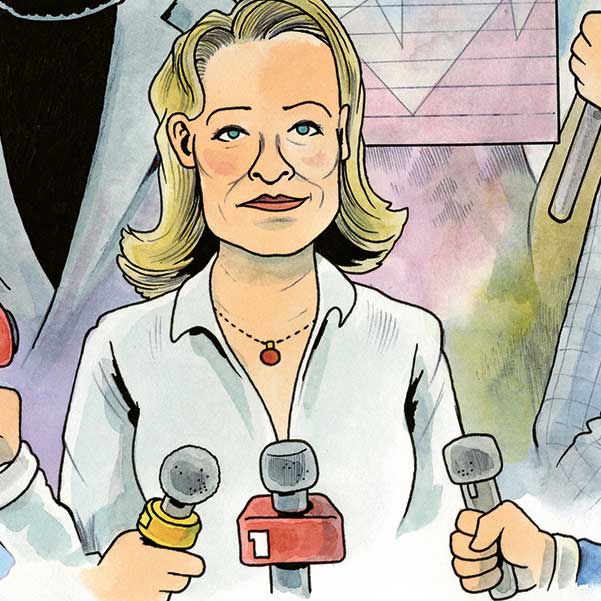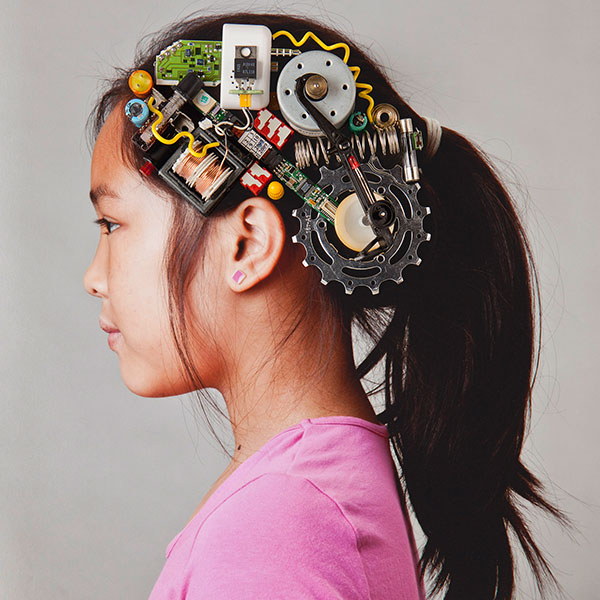Stereotypical experts
Whether argumentative, communicative or just classically objective: experts appear in the media in all kinds of functions. The communication scientist Mike S. Schäfer has gone hunting for archetypes for Horizons.

Martin Vetterli, 1957*, professor of information technology and communication, and President of EPFL | Illustration Andreas Kiener
The communication expert in high office
Thanks to his prominent position, Martin Vetterli is often featured in the Swiss media as an expert on university and science policy. He has been President of EPFL since early 2017, and before that, from 2013 to 2016, he was President of the National Research Council of the Swiss National Science Foundation. He is also often featured as a media expert in his own field of digitisation. He has a column in the daily newspaper Blick, where he regularly discusses digital topics such as speech recognition, GPS or artificial intelligence. He is also active in a communication role, is often on social media, and is keen to engage in dialogue. He has 3,500 followers on Twitter. He and his team regularly post tweets on a relatively broad spectrum of topics from the worlds of science and science policy.

Kathrin Altwegg, 1951*, Professor emeritus for space research & planetary sciences, University of Bern | Illustration Andreas Kiener
The classical expert
The space researcher Kathrin Altwegg is often in the Swiss media, mostly talking about her research field. Many of her media appearances have been on account of her participation in the Bernese team for the Rosetta Mission of the European Space Agency ESA. As is typical in the natural sciences, Altwegg is usually asked by the media to contribute to science pages or science features, where she generally discusses her own research. At the same time, this astrophysicist has a few surprises up her sleeve with regard to her own career. She studied physics in Basel in the 1970s when she was the only woman in the lecture hall. Besides being asked about her research, Altwegg is often the subject of biographical features, given that she is a Swiss, female pioneer in a field dominated internationally by men. In the course of her career, Altwegg has also campaigned vigorously for the promotion of women in academia.

Reiner Eichenberger, 1961*, professor of financial and economic policy at the University of Fribourg | Illustration Andreas Kiener
The argumentative expert
Immigration, pension reform, transport, the health sector, the basic wage – Reiner Eichenberger, professor of economics, offers his opinion on all kinds of topics in the media. His courage in offering trenchant opinions and hypotheses has made him a sought-after conversation partner, but it’s also led the daily newspaper Tages-Anzeiger to call him a ‘trouble-maker’. In the tabloid newspaper Blick, for example, he’s written demanding a ‘penalty tax’ on immigrants, and in the Handelszeitung he has described the current debate about health costs as ‘absurd’. Not least because of his strong media presence, Eichenberger is regarded as one of the most influential economists in Switzerland. In 2017, for the second time running, he was assigned second place in the ranking of economists published by the Neue Zürcher Zeitung – also largely on account of his media activities. In fact, it’s relatively rare for Eichenberger to be quoted in the business pages, and just as rare to read of him in the science section. That’s typical for a social scientist. His contributions on factual issues are often featured in the national news, in cultural supplements and in the opinion columns.

Dirk Helbing, 1965*, professor of computational social science at ETH Zurich | Illustration Andreas Kiener
The expert with the hard facts
Dirk Helbing is an expert who’s in demand both at home and abroad. He offers his opinions on a broad spectrum of topics, though they all have to do with the opportunities and risks of our digital society. For example, Helbing warns about the consequences of saturating our everyday lives with artificial intelligence, or about the impact of the digital revolution. And he also encourages people to be active about ensuring the protection of their private sphere. Whenever he speaks, there’s a connection to his own research field. Helbing took his doctorate in physics, but his research was always interdisciplinary, situated at its interface with society. For example, he’s investigating how mass hysteria arises, and how social processes can be simulated by computer. He offers his opinions in almost all sectors of the media – in the cultural, business or politics pages, and also in regional columns.

Miriam Meckel, 1967*, professor for corporate communication, University of St. Gallen | Illustration Andreas Kiener
The public intellectual
Miriam Meckel knows both sides of the media inside out. As the chief editor of the German weekly magazine Wirtschaftswoche, she herself invites experts to express their opinions. But she’s also a communication scientist ready to offer her own ideas about matters such as societal change in connection with digitisation, the political consequences of digital communication, or – most recently – the topic of self-optimisation. Sometimes she focuses on her own research, but not always. Meckel also writes popular books, such as about an episode of burnout she experienced. Her newest book is: ‘My head belongs to me: a journey through the brave new world of brain-hacking’. And together with her partner, the ARD talk-show host Anne Will, Meckel also writes for the blog ‘Pipifax’.




